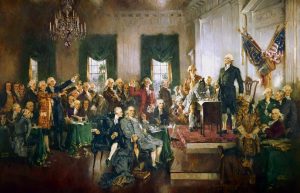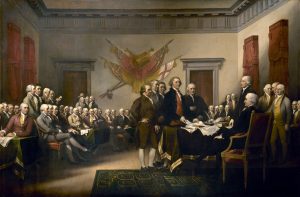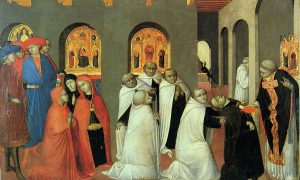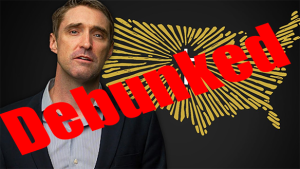We are going to take a brief break from our normal content to discuss constitutional interpretation. One of the most common arguments you will hear for the USA being a Christian Nation is that “separation of the church and state is not actually in the Constitution”. This is not just from random people, either. High-ranking Political figures, such as Representative Boebert and Speaker of the House Mike Johnson, have made it the mission statement of their political careers. Today, we will discuss in detail what the Constitution actually says on this issue, how we are to interpret this in the context of 1776, and finally discuss other early American legal documents and what they say on this issue.
Literal Interpretation
The words “separation of church and state” do not appear in the Constitution. Rather, they are an interpretation of what the Constitution says, which appears in Thomas Jefferson’s Letter to the Danbury Baptists.
“I contemplate with sovereign reverence that act of the whole American people which declared that their legislature should make no law respecting an establishment of religion, or prohibiting the free exercise thereof,” thus building a wall of separation between Church & State. Adhering to this expression of the supreme will of the nation in behalf of the rights of conscience, I shall see with sincere satisfaction the progress of those sentiments which tend to restore to man all his natural rights, convinced he has no natural right in opposition to his social duties.” – Letter to the Danbury Baptists, 1802
Addressing this letter and the Constitution, Mike Johnson says this:
“Jefferson clearly did not mean that metaphorical “wall” was to keep religion from influencing issues of civil government. To the contrary, it was meant to keep the federal government from impeding the religious practice of citizens. The Founders wanted to protect the church from an encroaching state, not the other way around. (…) What these two Founders and their fellow patriots all understood from history was that there are many important rules and practices that can help build and sustain a healthy republic. But the key – and the essential foundation – of a system of government like ours must be a common commitment among the citizenry to the principles of religion and morality.” – Mike Johnson, The True Meaning of Separation of Church and State
We have briefly covered this sentiment in a previous article, and what was said there is still true. I must address however that I, the author, have no idea what this means.
Yes, I understand that the Constitution exists to keep the government from encroaching on the rights of citizens to worship. What I do not understand is how it is possible for the church to be involved in government without it leading directly to the federal government impeding the religious practices of citizens.
What does the constitution say?
Here is what the Constitution actually says regarding freedom of religion:
“Congress shall make no law respecting an establishment of religion, or prohibiting the free exercise thereof; or abridging the freedom of speech, or of the press; or the right of the people peaceably to assemble, and to petition the Government for a redress of grievances.” – The US Constitution
It is significant that we see freedom of religion paired with the other freedoms of speech, assembly, press, and protest because each freedom in the first amendment reinforces the others. Freedom of religion is ultimately the freedom to worship God according to your individual convictions. For most people, this includes corporate gathering (freedom of assembly), to hear a sermon (freedom of speech) which teaches scriptural truths (freedom of the press).
This brings us back to the Mike Johnson quote. Telling people how they are to worship God is the express purpose and founding mission of The Church. Church Members voluntarily submit to an individual church’s authority so that the Church may restrict how they worship, as well as what they say, when they gather, and how they interpret scripture. By joining a church, you willingly surrender your rights of speech, assembly, press, and protest, within a specific context, so that you may engage in the worship of The Lord.
This idea that the relationship between Church and State is a two-way street is nonsensical. If the church is giving authority over any individual, whether through political means or by the individual’s willing participation through church membership, the church must tell the individual to worship or it stops being the church.
Interpreting the Constitution
This may not be enough for you; fortunately, we do not need to rely on my interpretation alone. Looking at the context in which the constitution was written, as well as how the Founding Fathers interpreted the freedom of religion, it is clear that the Constitution calls for a total separation of Church and State not a partial one.
The Religious Convictions of The Founding Fathers
One of the most damning pieces of evidence is that many of our nation’s fathers were not Christian. In particular, Benjamin Franklin, Thomas Jefferson, and John Adams each denied Christ’s divinity (Adams was a Christian at one point but became a Unitarian over time).
“I contemplate with sovereign reverence that act of the whole American people which declared that their legislature should “make no law respecting an establishment of religion, or prohibiting the free exercise thereof,” thus building a wall of separation between Church & State. Adhering to this expression of the supreme will of the nation in behalf of the rights of conscience, I shall see with sincere satisfaction the progress of those sentiments which tend to restore to man all his natural rights, convinced he has no natural right in opposition to his social duties.” – Letter to the Danbury Baptists, 1802, Thomas Jefferson
These three men drafted, finalized, and proofed the Declaration of Independence. John Adams would go on to be our second president, and Jefferson would go on to be our first secretary of state, second VP, and third president.
James Madison
Our fourth President, Madison is known as “Father of the Constitution,” a title he earned rightly. He authored the Virginia Plan, which served as the blueprint for our constitution, co-wrote the Federalist Papers advocating for the constitution’s adoption, and played a key role in drafting the Bill of Rights, the first ten amendments of the Constitution, including the freedom of religion.
While his religious convictions aren’t fully known, he was widely believed to be a Unitarian, not a Christian. He dedicated a significant portion of his career to defending and reinforcing the separation of church and state. Drafting at least four well-known documents arguing for religious freedom. One of which was directly addressing and arguing against the existence of an official state Church in Virginia, he would then go on to champion the Virginia Statute for Religious Freedom, a bill which granted complete religious freedom in the state.
The Treaty of Tripoli
The Treaty of Tripoli is the United States’ oldest military treaty. It secures America’s shipping rights and protections against piracy from the Barbary state of Tripoli. Article Treaty of 11 says this:
“As the Government of the United States of America is not, in any sense, founded on the Christian religion,—as it has in itself no character of enmity against the laws, religion, or tranquility, of Mussulmen [Muslims],—and as the said States never entered into any war or act of hostility against any Mahometan [Mohammedan] nation, it is declared by the parties that no pretext arising from religious opinions shall ever produce an interruption of the harmony existing between the two countries.”
Conclusion
To summarize:
- Three of our first four presidents, including the writers of the Declaration of Independence and the “Father of the Constitution,” were not Christians.
- Our oldest military treaty, signed by our second president, expressly says America is not a Christian state.
- The First Amendment starts with the words “Congress shall make no law respecting an establishment of religion.”
The Phrase “Separation of Church and State” may not be in the Constitution, but it is constitutionally sound. Any argument that America is meant to be a Christian nation is unconstitutional as well as unbiblical, and directly contradicts the express will and intent of our nation’s Founders.
Want to see quotes from the founding fathers on separation of church and state? Click Here
Want to see full documents regarding founding fathers and freedom of religion? Click Here
Sources
The Complicated Religious Life of Ben Franklin | Baylor Magazine | Baylor University, magazine.web.baylor.edu/news/story/2024/complicated-religious-life-ben-franklin. Accessed 3 Oct. 2025.
“George Washington’s Letter to the Hebrew Congregation of Newport, Rhode Island: Loeb Institute: Columbian College of Arts & Sciences: The George Washington University.” Loeb Institute | Columbian College of Arts & Sciences, loeb.columbian.gwu.edu/george-washingtons-letter-hebrew-congregation-newport-rhode-island. Accessed 3 Oct. 2025.
“The Barbary Treaties 1786-1816 Treaty of Peace and Amity, Signed at Tripoli June 4, 1805.” Avalon Project – The Barbary Treaties 1786-1816 – Treaty of Peace and Amity, Signed at Tripoli June 4, 1805, avalon.law.yale.edu/19th_century/bar1805t.asp. Accessed 3 Oct. 2025.
“Jefferson’s Religious Beliefs.” Monticello, www.monticello.org/research-education/thomas-jefferson-encyclopedia/jeffersons-religious-beliefs/. Accessed 3 Oct. 2025.
Yalepress. “Reconciling Deism and Puritanism in Benjamin Franklin.” Yale University Press, 12 Apr. 2022, yalebooks.yale.edu/2017/05/12/reconciling-deism-and-puritanism-in-benjamin-franklin/.
“Jefferson’s Letter to the Danbury Baptists the Final Letter, as Sent.” Jefferson’s Letter to the Danbury Baptists (June 1998) – Library of Congress Information Bulletin, www.loc.gov/loc/lcib/9806/danpre.html. Accessed 3 Oct. 2025.
Excerpts from Madison’s Detached Memoranda, 3ieevl.chessermanic.com/click.php?key=d2d09ut92fb007ias7g0&COST_CPC=&PUBLISHER_ID=1292233&ZONE_ID=3084436&SUB_ID_SHORT=59e614d91beb3ae50a56ed07c1732d81&CAMPAIGN_ID=1282282&PLACEMENT_ID=20923511&type=Post-Proxy&landing_id=42&_pd=whicoosparabed.com. Accessed 3 Oct. 2025.




2 Responses
All based on opinion.
All based in quotes from either official US Documents- OR Letters written by major founding fathers?
https://modernpharisees.net/quotes-from-the-founding-fathers-on-separation-of-church-and-state/